On November 20, Uganda’s parliament passed the Narcotic Drugs and Psychotropic Substances (Control) Bill, also known as the Narcotics Law. A draconian piece of legislation, the law purports to deter drug abuse by imposing inhumanely long prison sentences-a conviction for simple possession can land a person in a cell for 25 years.
Sex, criminal law & HIV non-disclosure: What is wrong with Canada’s approach to HIV non-disclosure? (Canadian HIV/AIDS Legal Network, 2014)
This is the second of two short videos from the Canadian HIV/AIDS Legal Network explaining what the law currently is relating to HIV non-disclosure (covered in Part 1) and what is wrong with this approach. Watch Part 1 here: http://bit.ly/1oMs1DM
The Criminalization of HIV in Canada
(32 mins, BearPaw Media, Canada, 2014)
The Canadian Aboriginal population is one of the fastest growing groups being diagnosed with HIV today. Due to a lack of education, people living with HIV continue to face fear and discrimination. Court and legislator involvement in their lives makes matters even more complicated. This video features four Aboriginal Canadians diagnosed with HIV. In hearing their stories, the viewer will learn how they cope with the stigma surrounding their illness and live within the new rules governing the most intimate part of their lives.
See more at: http://ncsa.libguides.com/bearpawvideos
Canada: Social media campaign ‘Think Twice’ uses video to ask gay men to reconsider pressing charges for HIV non-disclosure
Last week saw the launch of a new phase of a targeted social marketing campaign by AIDS ACTION NOW! (AAN) that features 42 short videos from members and allies of Toronto’s LGBTQI community.
‘Think Twice’ asks HIV-negative and untested gay, bi, queer and trans men to reconsider pressing charges for HIV non-disclosure (where there was no alleged HIV transmission) when they discover that a sexual partner has not disclosed their HIV-positive status before sex.
In October 2012, the Supreme Court of Canada confirmed that non-disclosure of known HIV status can be charged as aggravated sexual assault – with up to life imprisonment and sex offender registration – even if the person with HIV uses a condom: in order to avoid legal liability, they must also have a low viral load.
‘Think Twice’ is an AAN campaign originally launched just prior to the Supreme Court’s ruling aimed at decreasing the number of criminal prosecutions related to HIV non-disclosure. AAN want people involved in the criminalisation of HIV non-disclosure—people living with HIV, their sexual partners, police, Crown prosecutors, health care providers and others—to consider the complexity and uncertainty of Canada’s overly broad approach to HIV criminalisation, and the implications of their role in criminal prosecutions for HIV non-disclosure.
The first part of their campaign targeted Crown prosecutors since they play a pivotal role in driving criminal prosecutions.
Since December 2012, the ‘Think Twice’ campaign has also focused on another key advocacy target – potential complainants.
This new phase of the ‘Think Twice’ campaign focuses specifically on gay, queer, and trans men and other men who have sex with men, due a change in community norms in the past few years that has resulted in an increase in the numbers of men going to the police to lay charges against other men living with HIV.
According to the Canadian HIV/AIDS Legal Network, while the majority of cases in Canada are against men who had sex with women, an increasing number of gay men and other men who have sex with men are being charged and prosecuted in Canada. Whereas there were only five known cases prior to 2006, a further 25 cases have been tracked up to December 2013.
In 2014, there has been at least one new case against a gay man. Another – where two men met in a Montreal sauna – dating back to 2005, is due to be heard by the Supreme Court of Canada next month.
For this latest phase of the ‘Think Twice’ campaign, AAN placed an open call for gay, queer, bi and trans men, and their allies, to make a video that answered the question: ‘In 45 seconds what would you say to gay men to convince them to think twice before going to the police when a sex partner hasn’t disclosed to them.’
Although they only expected to make 25, a total of 42 individuals made videos, in a project organised by Jordan Bond-Gorr, Lauryn Kronick, Tim McCaskell and Eric Mykhalovskiy and filmed by multi-disciplinary artist, John Caffery, in Toronto over one weekend in August.
The videos – along with the website www.thinktwicehiv.com – were launched on 18th November at Toronto’s Buddies in Bad Times theatre.
This compilation of 18 of the videos, produced by the HIV Justice Network, highlights the breadth of messages and the range of stakeholders involved.
It features (in order of appearance):
and John Greyson.
For more information about this campaign, visit the ‘Think Twice’ FAQ page.
[Feature] Beyond Blame: Challenging HIV Criminalisation
Beyond Blame: Challenging HIV Criminalisation
A pre-conference meeting for AIDS 2014
In July 2014, at a meeting held to just prior to the International AIDS Conference in Melbourne, Australia around 150 participants from all regions of the world came together to discuss the overly broad use of the criminal law to control and punish people living with HIV – otherwise known as ‘HIV criminalisation’.
The meeting was hosted by Living Positive Victoria, Victorian AIDS Council/Gay Men’s Health Centre, National Association of People Living with HIV Australia and the Australian Federation of AIDS Organisations, with the support of AIDS and Rights Alliance of Southern Africa, Canadian HIV/AIDS Legal Network, Global Network of People Living with HIV, HIV Justice Network, International Community of Women Living with HIV, Sero Project and UNAIDS.
The meeting was financially supported by the Victorian Department of Health and UNAIDS.
This highlights video (12 mins, 50 secs) was directed, filmed and edited by Nicholas Feustel, with interviews and narration by Edwin J Bernard. The video was produced by georgetown media for the HIV Justice Network.
Download the highlights video from:http://vimeo.com/hivjustice/beyondblame
Below is a feature story based on the transcript of the highlights video, with additional links and information. You can also read Felicita Hikuam’s excellent (and remarkably quickly-written) summary of the day in ‘Mujeres Adelante’ and Daniel Reeders’s impressive collection of tweets from the meeting.
FEATURE STORY
A day to come together, find solutions, and move forward
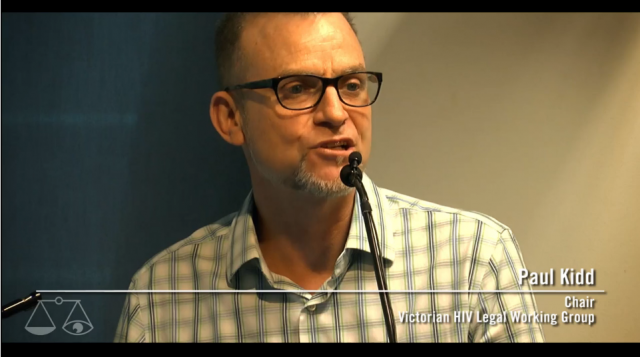
Paul Kidd: On behalf of Living Positive Victoria, the Victorian AIDS Council, Australian Federation of AIDS Organisations, and the National Association of People with HIV Australia, welcome to Beyond Blame: Challenging HIV Criminalisation. We hope today’s event is inspiring and productive and that it kicks off the discussion about HIV criminalisation that will continue through the week and beyond.
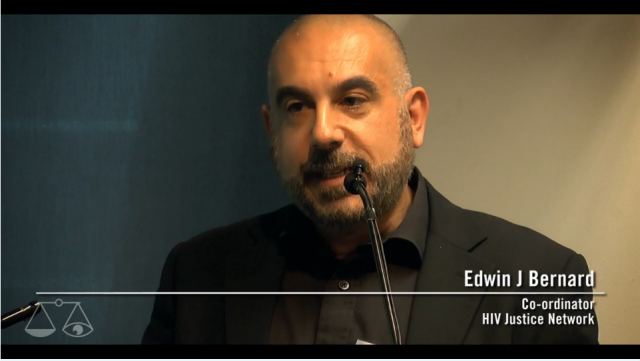
Edwin Bernard: I think this is the largest HIV Criminalisation Pre-Conference to date at an International AIDS Conference. So the idea of the meeting is to bring people together. People who are working on this issue, who are interested in learning more about it, and we’re going to really work hard to come together, find solutions, and move forward.
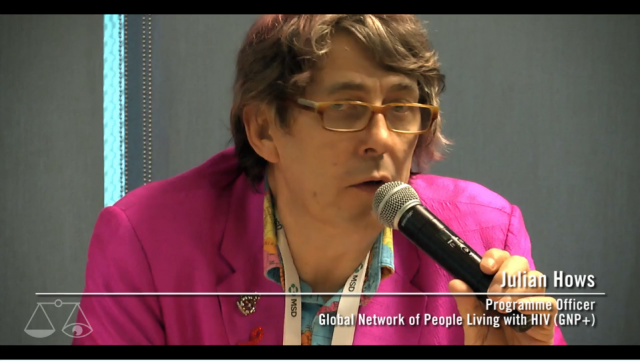
Julian Hows: GNP+ has been involved in this issue of criminalisation since 2002, 2003, when we noticed an increase in the rates of prosecution in Europe effectively and started the first scan of the 53 signatory countries of the European Convention on Human Rights.
This has since become the Global Criminalisation Scan, an international ‘clearing-house’ of resources, research, and initiatives on punitive laws and policies impacting people living with HIV.
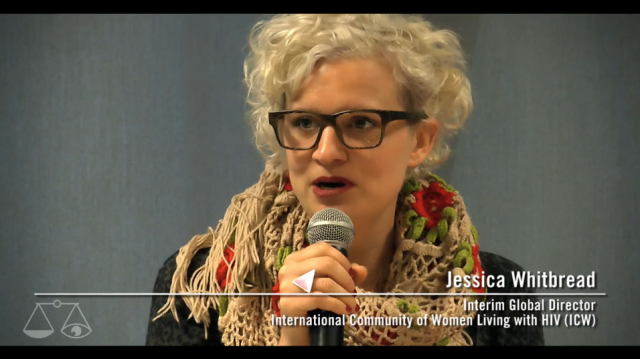
Jessica Whitbread: And ICW are really, really excited to be here and part of this. Criminalisation is a huge issue for us. Over 50% of people living with HIV are women and many of these laws initially and still continue to be created as a way to protect women when actually they put us more at risk.
Getting the criminal law changed and out of the HIV response
The meeting began with a surprise announcement by the Minister of Health for Victoria, David Davis, about Australia’s only HIV-specific criminal law, Section 19A of the Victorian Crimes Act. Read more about the campaign to reform the law here.
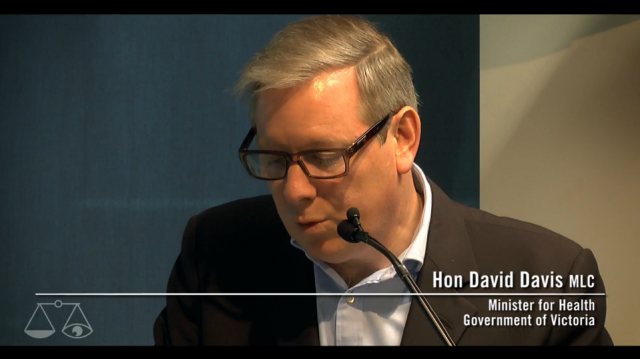
David Davis: And as a further step in our efforts to reduce the impact of HIV and reduce stigma and discrimination, the coalition government will amend section 19A of the Crimes Act 1958 to ensure that it is non-discriminatory.
Following the announcement Victoria’s Shadow Health Minister, Gavin Jennings, committed to removing (and not just amending) Section 19A within the next 12 months, should Labor win the state election in November.
A keynote address by the Honourable Michael Kirby, a former Justice of the High Court of Australia, and a member of the Global Commission on HIV and the Law, reminded us why an overly broad criminal justice apporach to prevention does more harm than good.
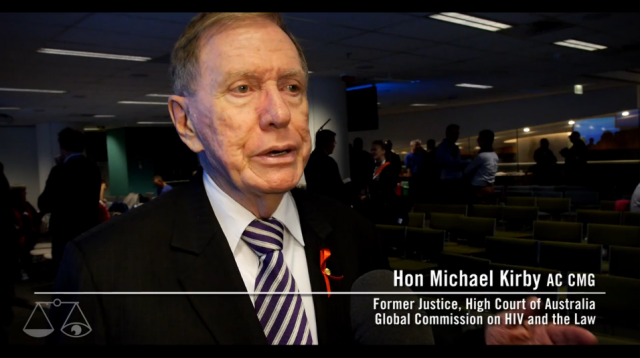
Michael Kirby: In the big picture of this great world epidemic, the criminal law has a trivial role to play. What is most important is getting the law changed and out, not getting the law into the struggle against HIV and AIDS.
The Iowa example: laws are subject to change and should be subject to change
The meeting then focused on Iowa in the United States where both law reform and judicial rulings have limited the overly broad use of the criminal law.

Matt McCoy: You know, in Iowa, we had a very bad law on the books, but it’s not unlike a lot of other places in the country in the United States and in the world. So there was no need for transmission, and with it, the penalty was so extreme, a mandatory lifetime sex offender registry and 25 years in prison.
Watch the video that Senator McCoy showed at the meeting explaning how law reform in Iowa happened.
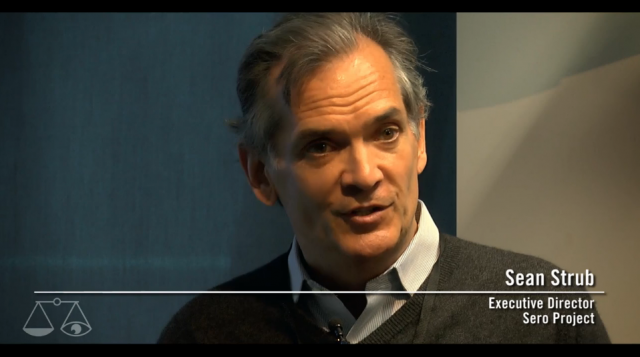
Sean Strub: Iowa is a conservative farm-belt state. And the effort there began with a small group of people with HIV who started organising others with HIV and educating their own communities and then educating public health officials and reframing the issue in terms of a public health issue rather than simply an issue of justice for people with HIV. Last month, we held a conference at Grinnell College in Grinnell, Iowa. It was the first national conference on HIV criminalisation in the US. The Friday before our conference began, Governor Branstad in Iowa signed a criminalisation reform measure and made Iowa the first state in the United States to subtantively reform and modernise their statute.
Two videos of the HIV Is Not A Crime conference (also known as the Grinnell Gathering) are available. One shows the opening ceremony and can be viewed on the Sero website. A second video highlights the voices of US HIV criminalisation survivors featured at the meeting, and can be viewed on the Sero website.
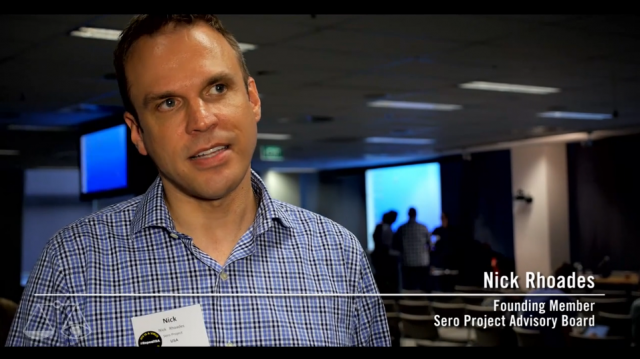
Nick Rhoades: About a week after the conference was over, the timing was just a little bit off, nonetheless, it’s fantastic. My conviction was overturned by the Iowa Supreme Court. Yeah. Thank you… It’s kinda groundbreaking, their decision, and I, first of all, think that it’s going to have an effect beyond Iowa’s borders, but it basically said that there has to be more than a theoretical chance of transmission to be prosecuted under the law. And previously, that’s not been the case. Basically, it was just if you didn’t disclose, and you had sex, that that would be enough to convict someone. So, for the first time, they basically said that factors such as using protection, being on antiretroviral medication, having an undetectable viral load specifically, should affect whether or not prosecution is able to happen.
Senator McCoy took the opportunity to urge parliamentarians to rethink how they treat HIV in a criminal context.
Matt McCoy: Many of these laws went into effect in the United States during the AIDS crisis and the scares that society had around the issue, and in many cases they were put into effect using a one-size-fits-all measure. And so this is a great opportunity to go back and to revisit that and to realise that our laws are subject to change and should be subject to change.
Science can change laws and limit prosecutions
A number of countries in Europe have also recently revisited their criminal laws, policies or practices. A poster, Developments in criminal law following increased knowledge and awareness of the additional prevention benefit of antiretroviral therapy, presented at AIDS 2014 by the HIV Justice Network, showed where and how this has taken place.
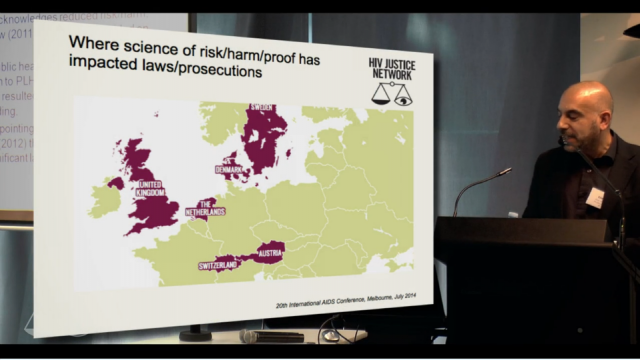
Edwin Bernard: We have to salute the Netherlands, the very first place in the world that actually, way before the Swiss statement, between 2004 and 2007, managed to change the application of the law through a variety of Supreme Court rulings, but also because of advocacy that happened with advocates and healthcare workers and people in the community who limited the role of the criminal law to only intentional exposure or transmission. Denmark was the only country in Western Europe that had an HIV-specific criminal law, and a huge amount of advocacy went on behind the scenes and that law was suspended in 2011 based on the fact that the law was about a serious, life-threatening illness, and the reality was that in Denmark, people living with HIV have exactly the same life expectancy as people without HIV. And so the law just couldn’t apply anymore. And so, we hope that the places like Denmark and the Netherlands will provide inspiration for the rest of us.
Urgent need to focus on global South
But with two-thirds of all HIV-specific criminal laws enacted in the global South, there is now an urgent need to re-focus our efforts.
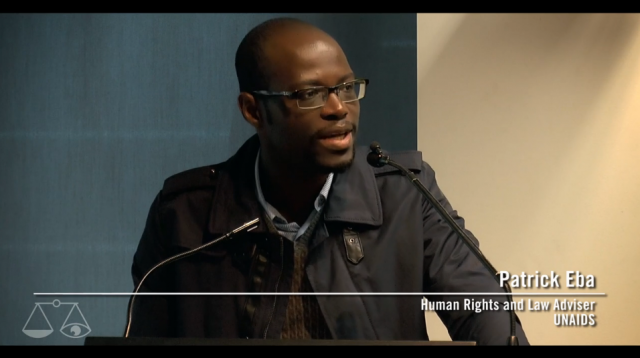
Patrick Eba: For a long time, we have been saying that there is no prosecution happening in the Global South, particularly in Africa, because we were lacking the information to be able to point to those instances of criminalisation. In fact, there is a lot of prosecution that is happening, and in the past year, if you look at the data that is being maintained by the HIV Justice Network, it is clear. We’ve seen the case in Uganda. We know of a decision that came out some time late last year in South Africa. We know of a number of cases in Kenya, in Gabon, in Cameroon [and especially in Zimbabwe]; and these really show that where we celebrate and are able today to know what is happening in the Global North, our lack of understanding of the situation in the Global South is one that requires more attention.
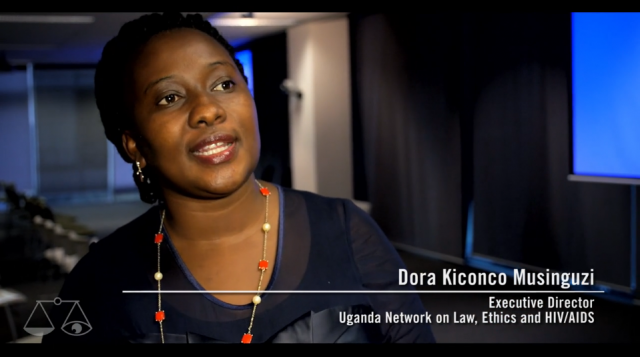
Dora Musinguzi: Uganda is right now grappling with lots of human rights and legal issues, and it’s going to be such a high climb to really convince our governments, our people, government agencies to make sure that we really have this reform of looking at HIV from a human rights angle, public [health] angle, gender justice angle, if we are going to achieve the gains that we have known to achieve as a country. …But we stand strong in this, we are not giving up. We are looking to a future where we shall challenge this criminalisation, and we hope to come back with a positive story.
Workshops on advocacy messages, science and alternatives to a punitive criminal justice approach
After the morning plenary sessions, participants then attended one of three workshops. The first workshop explored how to get advocacy messages right, in terms of what arguments need to be delivered by whom and to whom.
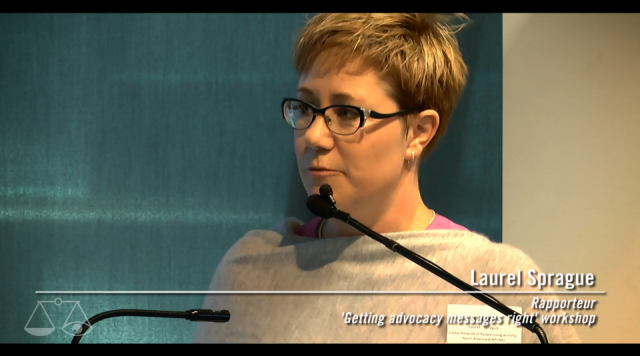
Laurel Sprague: We talked about the importance of stories. In particular, the stories of people who have been prosecuted, both because of the dignity it gives them to be able to share their own experience, and also because what we’re seeing is so broadly understood to be disproportionate once the details come out.
Laurel’s rapporteur notes can be downloaded in full here. For an example of advocacy messagaging aimed at communities impacted by HIV see this video from Queensland Positive People.
A second workshop highlighted the way that up-to-date science on HIV-related risks has limited the application of the criminal law in Sweden and Canada.
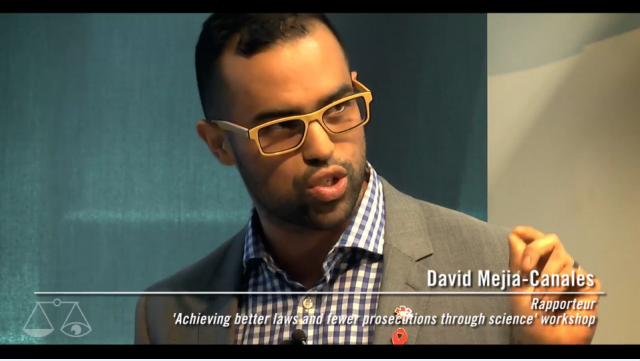
David Mejia-Canales: Really mobilising their scientists, their researchers and really connecting with the lawyers, the judiciary, the prosecutors and putting to them the best evidence that they have.
Download the Powerpoint presentation given by Cecile Kazatchine of the Canadian HIV/AIDS Legal Network here.
The third workshop examined alternatives to a punitive criminal justice system approach, and the risks and benefits of using, for example, public health law or restorative justice.
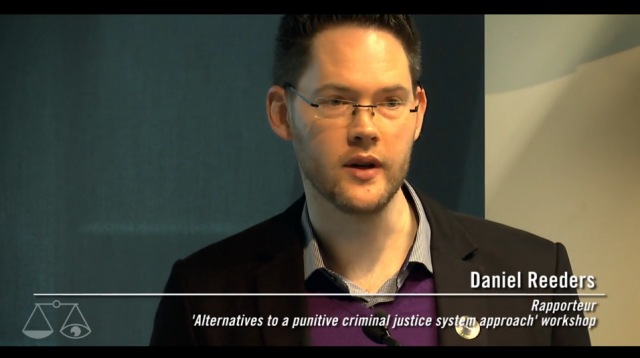
Daniel Reeders: So if someone shows up at a police station or talks to their doctor about being exposed or infected with HIV, a restorative justice approach would talk about giving them an opportunity to work that issue through with the person who they are otherwise trying to report, either for criminal prosecution or public health management. It acknowledges that people experience HIV infection as an injury and that there is a lack of a process offering them an opportunity to heal.
Daniel’s entire rapporteur report can be read on his blog.
Going home with more ideas and tools and inspiration to continue our work
As the meeting came to a close participants appreciated the day as a rare and much needed opportunity to discuss advocacy strategies.
Paul Kidd: What a day! It is just so amazing to be in this room with all of these incredible people and the sense you have of how much passion and energy and commitment there is around this issue.
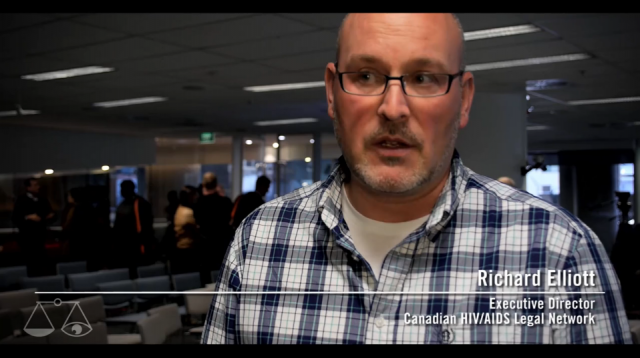
Richard Elliott: Even as we face numerous setbacks in our own context sometimes, we see that in fact people are making breakthroughs elsewhere and then that helps us put pressure domestically on decision makers, on legislators, on judges.
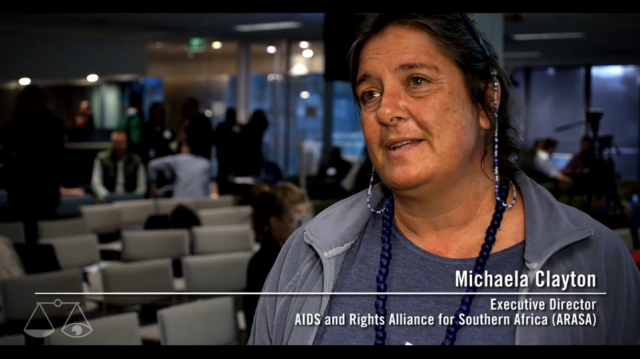
Michaela Clayton: It’s important to learn from how people have achieved successes and what have been peoples’ problems in achieving successes in different countries in addressing criminalisation. So for us it’s a wonderful opportunity to learn from others.
Dora Musinguzi: I was encouraged to know that the struggle is not only for us in Africa, in Uganda, and I was also encouraged to know that our colleagues have made progress, and so we can.
Sean Strub: I think everywhere that there is an effort for this advocacy for reform, it is a constantly evolving effort. And the fact that the HIV Justice Network and others brought together this global community which is incredibly mutually supportive. I think of any aspect of the epidemic, I can’t think of an area where there is more collegiality and mutual respect than those of us who’ve centered our work around criminalisation reform. That’s what we’re seeing here in Melbourne, just an expansion of that, and all of us going home with more ideas and tools and inspiration to continue our work.
To remain connected with the global advocacy movement against overly broad HIV criminalisation, like us on Facebook, follow us on Twitter and sign the Oslo Declaration on HIV Criminalisation to join our mailing list.
Sweden: Supreme Court refuses to rule on treatment’s impact on HIV risk even as a second Court of Appeal judgement recognises latest science
Last week, Sweden’s Supreme Court announced that it would not grant leave to appeal in a case where the prosecution had appealed an acquittal from Court of Appeal regarding a man living with HIV, on successful antiretroviral therapy, who had unprotected sex with several women none of whom were infected. Instead, it cited its 2004 ruling stating that only sex with a condom can prevent a prosecution for ‘HIV exposure’ (as reckless endangerment).
The Swedish Prosecutor’s office notes that
“The Supreme Court’s decision means that the Court of Appeal’s acquittal cannot be considered indicative. Instead, the Supreme Court judgment of 2004 is still indicative. The legal situation has not changed.”
Advocates are extremely unhappy. Although lower courts can still take notice of ‘Risk of HIV transmission from patients on antiretroviral therapy: A position statement from the Public Health Agency of Sweden and the Swedish Reference Group for Antiviral Therapy‘ (aka the ‘Swedish statement’) in future trials for people with HIV on successful treatment, this was a lost opportunity to modernise the application of the law from the highest court in the land.
An editorial by Oisín Cantwell in Monday’s popular newspaer, Aftonbladet, spelled out exactly what this means.
The fear of AIDS will survive The Supreme Court had a chance to make up with the judiciary outdated views on HIV. But a new decision means, unfortunately, that people will continue to be convicted of crimes they did not commit. The Court of Appeal for Skåne and Blekinge last year acquitted a man living with HIV and who had had unprotected sex with four different women [all of whom] did not become infected. The district court had sentenced him to one year in prison, but the Court of Appeal brought in the opinion of the [Swedish] Centre for Disease Control and allowed a professor to testify. According to both the CDC's expert statement and the professor, the [HIV transmission] risk during vaginal sex is very low. The Court of Appeal found that since the man was well-managed on medication "the probability that the intercourse to which the charge relates would result in the transmission of HIV was so small that no real danger can not be considered to have existed." Thus, there was not any crime. Courageous verdict The verdict was courageous and progressive: the lawyers listened to some of the world's most skilled and knowledgeable researchers in the field and took a decision that could lead to scientific criteria forming the basis of when prosecutions should be instituted in cases related to HIV. The Prosecutor appealed to the Supreme Court to see if it would stand up and be the guide. Now the Supreme Court's curt decision has been reached, the case is not addressed. This means on one hand that the Court of Appeal's ruling is upheld. The man is innocent. But the Supreme Court writes, in addition, that a ruling from 2004 still applies in practice. Very unfortunate That case concerned a man who had had a significant number of sex with ten men [all of ] whom were not infected. He was sentenced to one year in prison for reckless endangerment. That this judgment will in the future be the guiding principle is very unfortunate. It was reasonable when it was delivered, but in the ten years that have passed since then, research has made great progress. Today's medicine allows those living with HIV on successful treatment are simply not infectious. In addition there is now much better knowledge of the risks than then. In other words, its no sensation that Jan Albert, Professor of Infectious Disease at the Karolinska Institute, is surprised that the Supreme Court still drags out the old judgment. The consequence: stigma remains What, then, will be the consequence of the decision? The 1980s horror of AIDS will live on in the courtrooms and help maintain the future stigmatisation of those with HIV. It is perfectly understandable that people become terrified when they find out that they have had unprotected sex with someone with HIV. But this fear that is based on ignorance. No need to disclose In its recommendations, the National Board writes that a doctor can now make their own judgment about whether their patient need to inform their [sexual] partner that they are living with the virus. Of course it will still be a crime to not adhere to treatment and, therefore, expose others to risk. But those who take their HIV seriously, which a substantial majority do, for obvious reasons, do not commit a crime when they have sex. That people may be sent to jail for something they have not done wrong is deeply offensive. Something tells me that the judgement also means that the huge amount of legitimate international criticism that has been leveled against Sweden, as one of the countries with the greatest zeal for HIV-related crimes, will not end.
Stockholm Court of Appeal finds successful treatment grounds for acquittal
However in June, the Stockholm Court of Appeal found that a woman living with HIV could not be held criminally liable for reckless endangerment when she was on successful antiretroviral treament. Instead they sentenced her probation and a 5000 kronor (€550) fine for reckless endangerment for having condomless sex with a man (who was aware of her status).
The ruling was reported in Allt om juridik on June 11th.
An HIV-positive woman indicted for repeated unprotected sex with a man was acquitted entirely in the District Court. A divided Court of Appeals has now made a somewhat different assessment, sentencing the woman to probation and a fine. A man reported a woman to the police and claimed that she had unprotected sex with him without telling him that she was infected with HIV. The woman was charged with attempted aggravated assault as well as reckless endangerment. At the trial the man changed his mind and said that he knew about the woman's HIV infection before the first sexual intercourse, but made a police report because of jealousy. The District Court noted that during the unprotected intercourse there had been some, but not significant, risk of HIV transmission. The Court also found that the defendant "harbored warm feelings" for the man, supported by the fact that she completed intercourse, trusting that any transmission of infection would not happen. Therefore, it was not established that the woman had the intent to transmit HIV infection, and the indictment for attempted aggravated assault was dismissed. Regarding the prosecution for reckless endangerment the District Court held that the consent had an exonerating effect because the risk of infection had not been as high. The Court stated that the question of exonerating consent existed to be judged by the severity of the risk and the risk that the danger would be realised. The Court found that HIV infection is a very serious disease. Unlike the District Court, the Court considers that the risk of infection in this case was so high during the period when the woman was untreated for HIV infection, 1 in 1000 through unprotected sexual intercourse, that the consent did not have an exonerating effect. After the time woman began to take antiretrovirals, there was a decreased risk of infection, however, so that the consent could be deemed to be exonerating. The woman sentenced thus for reckless endangerment only for the period when she was not on antiretroviral drugs. The penalty was determined to be probation and a fine.
Venezuela: National Assembly unanimously passes new rights-based law that protects people living with HIV from discrimination in all areas of life
On August 14th, the National Assembly (NA) of Venezuela passed a set of laws that, among other functions, ensure the rights of people carrying the Human Immunodeficiency Virus (HIV) and their families. The Law on Protection of People with HIV will aim to prevent discrimination and provide health care to AIDS patients as well as those who are HIV positive. “This law is born of the living history of these patients and family, who suffers discrimination he faced, he had no right to health, education, work, sport, recreation, housing, vehicle, and this law lay that story they told us the family and patients, “ said Vice President of the Permanent Commission for Integrated Social Development, Henry Ventura. (from http://lainfo.es/en/2014/08/14/venezuela-will-protect-people-with-hiv/)
The bill guarantees HIV-positive people equal conditions in terms of the right to work and hold public office, to education, healthcare, culture and sports, the benefits of social programmes, bank loans, confidentiality about their health status and respect for their prívate lives. It also states that having AIDS cannot be grounds for the suspension of paternity rights, while establishing that families are responsable for caring for and protecting people living with HIV.
The law guarantees equality for young people, because 40 percent of new cases are in the 15-24 age group. It also does so in the case of women, for whom it orders that special care be provided during pregnancy, birth and the postpartum period, as well as for people with disabilities and prisoners. The bill establishes penalties, disciplinary measures and fines for those found guilty of discrimination.
The idea is to prevent a repeat of situations such as one faced by a schoolteacher in a city in western Venezuela, who remains anonymous at her request. She was fired after a campaign against her was mounted by parents who discovered that she had gone to the AIDS unit in a hospital to undergo exams. However, the miliary and the police are exempt from the protective provisions against discrimination.
“We do not agree with that exception,” Estevan Colina, an activist with the Venezuelan Network of Positive People, told IPS. “No one should be excluded and we hope for progress on that point when parliament’s Social Development Commission studies it and it goes to the plenary for the second debate,” which will be article by article.
Nieves is confident that the second reading will overturn the military-police exception. But more important, said the head of ACCSI, “is the positive aspect of the law, starting with the unanimous acceptance of a human rights issue by political groups that are so much at loggerheads in Venezuela’s polarised society.”
The law, which NGOs and activists expect to pass this year, will give a boost to anti-AIDS campaigns. The support will be similar in importance to that given by a July 1998 Supreme Court ruling that ordered public health institutions to provide free antiretrovial treatment to all people living with HIV.
Criminal prosecution of HIV transmission – HIV Media Guide
Regardless of the merits of individual cases, criminal prosecution of people for exposure or transmission of HIV is considered by some commentators to be problematic because prosecutions:
Outrage HIV Justice Film Festival debuts at AIDS 2014 in Melbourne, first ever film festival to focus on HIV criminalisation
In the lead-up to AIDS 2014, ten powerful thought-provoking films from seven countries over three days (18, 19 and 21 July 2014) will outrage Melbourne film-goers by exploring how laws and policies aimed at controlling, punishing or disempowering specific groups of people living with, or at risk of HIV, harms not only human rights, but also the broader response to the HIV epidemic.
Curated by international HIV activist Edwin Bernard, co-ordinator of the HIV Justice Network, the Outrage HIV Justice Film Festival is presented in partnership with ACMI (Australian Centre for the Moving Image), Victorian AIDS Council and Living Positive Victoria.
The Outrage HIV Justice Film Festival includes four themed sessions: Women’s Injustices; Challenging HIV Criminalisation; Australian Responses to HIV Injustices; and Activism Against HIV Injustices.
“As the AIDS 2014 ‘Melbourne Declaration’ shines a spotlight on HIV injustices at the conference, the Outrage HIV Justice Film Festival‘s films, director Q&As, and panel discussions, will reveal the real stories behind the stigmatising mainstream media headlines, hopefully changing hearts and minds so that people understand why it’s important to advocate for change,” says the festival’s curator, Edwin Bernard, whose HIV Justice Network campaigns for an end to inappropriate uses of criminal laws to regulate and punish people living with HIV.
The Outrage HIV Justice Film Festival includes films never seen before in Australia and visits countries as diverse as Canada and Cambodia. “I hope that the sophisticated Melbourne cinema audience will be interested in challenging themselves to learn more about the forced HIV testing and imprisonment of a group of disenfranchised women in Greece, who were scapegoated by a cynical government trying to win votes in the 2012 election (in Zoe Mavroudi’s ‘Ruins: Chronicle of an HIV Witch-Hunt‘) or the harrowing impact of state-sponsored homophobia on the lives gay men and women in Jamaica (in Micah Fink’s ‘The Abominable Crime’),” says Edwin Bernard.
Other HIV criminalisation-related films include Positive Women: Exposing Injustice (Canada, 2012); Mark S King: HIV Criminalization Face-Off (US, 2012); HIV is Not a Crime (US, 2011); and How could she go on living as if weren’t there (Sweden, 2010).
“After each screening we’ll also be hearing from the film-makers themselves, many of whom are coming to Melbourne to talk about why they were outraged enough by these HIV injustices to make these films,” notes Bernard, whose own film ‘More Harm Than Good‘ is showing alongside three other short films that explore why a criminal justice approach to HIV prevention is hurting the HIV response.
“The moving image is a powerful expression of human experience. Through a diversity of perspectives, opinion, ideas, stories and images, the moving image helps us make sense of ourselves and our world through dynamic social, cultural and creative exchange. We’re delighted to have worked with our partners to present a compelling programme of cinema and talks focused on such a critical and important issue”. Helen Simondson, ACMI Public Programs Manager.
“This festival will, for the first time in Melbourne, bring together activist voices from around the world showing powerful work that highlights the injustice of HIV related discrimination,” says Simon Ruth, Chief Executive Officer of the Victorian AIDS Council. “Through documentary and drama, the diversity of the films is compelling, moving and ultimately inspiring.”
Punitive laws and policies aimed at controlling, punishing or disempowering specific groups of people living with, or at risk of HIV, is a hot topic and central theme of AIDS 2014, the much anticipated meeting of the International AIDS Society and largest international conference ever to be held in Melbourne.
“HIV justice is a key issue for people living with HIV in Melbourne as it is in many places around the world where even worse laws exist. Victoria still has punitive laws in place that we are fighting to have repealed. Outrage HIV Justice Film Festival takes advantage of AIDS 2014 to bring broader awareness of the damaging impact of unfair laws about HIV,” says Brent Alan, Executive Officer of Living Positive Victoria. “I hope as many Victorians as possible take advantage of the marvellous programme Edwin has curated to be presented in Melbourne’s home of cinema, ACMI.”
For more information and bookings visit www.outragefilmfestival.com or http://www.acmi.net.au/justice-film-festival-2014.aspx.
MEDIA ANNOUNCEMENT – Outrage HIV Justice Film Festival 18-21 July 2014
Flat funding, harsh laws could hurt Uganda's battle against HIV
KAMPALA, 25 June 2014 (IRIN) – Inadequate funding coupled with harsh laws targeting same sex unions could erode the gains so far made in the fight against HIV in Uganda, activists warn.